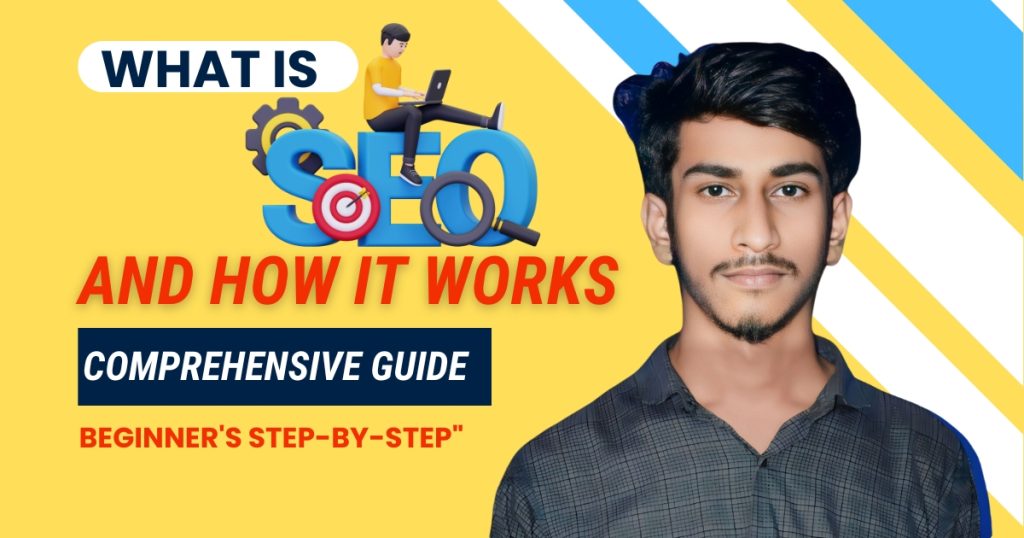What is SEO and how does it work: A Comprehensive Guide

Search Engine Optimization (SEO) is a fundamental strategy in digital marketing aimed at enhancing a website’s visibility on search engines. This guide will explain SEO by answering key questions and providing actionable insights. Let’s dive into the world of SEO and understand its workings step-by-step. What is SEO and how does it work in simple terms? SEO, or search engine optimization, is the process of optimizing a website to improve its visibility on search engines like Google. The goal is to attract organic traffic by making the site appear higher in search engine results for relevant queries. How does SEO work, step by step? To effectively utilize SEO, it’s essential to understand its step-by-step process: Keyword Research: Identify relevant keywords that potential customers use to search for your products or services. Use tools such as Google Keyword Planner, Ahrefs, or SEMrush for this research. Content Creation: Develop high-quality content around the identified keywords. Ensure the content is valuable, informative, and engaging. On-Page Optimization: Optimize title tags, meta descriptions, headers, and images. Integrate keywords naturally within the content. Ensure a good user experience (UX) with easy navigation and fast page loading times. Technical SEO: Enhance website speed and ensure mobile friendliness. Facilitate proper indexing by search engines. Use schema markup to enhance search results with rich snippets. Link Building: Acquire high-quality backlinks from reputable websites. Use strategies such as guest posting, outreach, and broken link building. Monitoring and Analytics: Track performance using tools like Google Analytics and Google Search Console. Adjust strategies based on data and trends. How does SEO actually work? SEO functions by optimizing various elements of your website to make it more appealing to search engines like Google. Here’s a breakdown: Crawling: Search engines use bots to crawl the web, discovering new and updated pages. Indexing: Discovered pages are indexed in a giant database. Ranking: When a user performs a search, the search engine uses complex algorithms to rank the indexed pages based on relevance, quality, and authority. What is simple SEO? Simple SEO refers to the basic, fundamental practices of optimizing a website. These practices are easy to implement and can yield significant results. Simple SEO includes: Keyword Optimization: Use relevant keywords naturally in your content. Meta Tags: Crafting compelling meta titles and descriptions. Alt Text for Images: Describing images with relevant keywords. Internal linking: linking to other pages on your website to improve navigation. Content Quality: writing informative, valuable content that answers users’ queries. What are some SEO examples? To better understand SEO, let’s look at some examples: On-page SEO: optimizing individual web pages to rank higher and earn more relevant traffic. This includes optimizing content, meta tags, and images. Off-page SEO: building backlinks from other websites to improve your site’s authority. Local SEO: optimizing your online presence to attract more business from relevant local searches. This includes optimizing your Google My Business profile. Technical SEO is ensuring that a website meets the technical requirements of modern search engines with the goal of improving organic rankings. Examples include site speed, mobile-friendliness, and SSL certification. How do I start SEO? Starting with SEO can be straightforward if you follow these steps: Learn the basics: Understand the core concepts and principles of SEO. Perform a website audit. Use tools like Ahrefs or SEMrush to audit your site and identify areas for improvement. Keyword Research: Identify the keywords relevant to your business and target audience. Optimize your website. Implement on-page SEO strategies, improve site speed, and ensure mobile friendliness. Create high-quality content. Develop valuable and engaging content that addresses the needs of your audience. Build Backlinks: Focus on acquiring high-quality backlinks to improve your site’s authority. Monitor and adjust: Regularly monitor your performance using tools like Google Analytics and make necessary adjustments. Is Google SEO easy? Google SEO can be easy or challenging, depending on various factors such as competition, industry, and the level of optimization required. Here are some aspects to consider: Easy Aspects: Basic on-page optimization (title tags, meta descriptions, and keyword usage). Creating high-quality content. Challenging Aspects: Technical SEO (site speed, mobile optimization, and structured data). Acquiring high-quality backlinks in a competitive niche. Can I do SEO alone? Yes, you can do SEO alone, especially for small businesses or personal websites. Here are some tips to get started: Learn SEO Basics: There are numerous free resources available online to learn SEO fundamentals. Use SEO Tools: Leverage tools like Google Analytics, Google Search Console, and free versions of paid tools like Ahrefs or SEMrush. Focus on Content: High-quality, relevant content is key to successful SEO. Be patient: SEO takes time to show results, so consistency and patience are crucial. For more advanced SEO needs, you might consider hiring an expert or an agency. SEO vs. Keyword Research Understanding the difference between SEO and keyword research is essential. Keyword research is a component of SEO. It involves identifying the keywords that your target audience uses when searching for your products or services. SEO encompasses this and many other strategies aimed at improving your website’s visibility on search engines. For more in-depth information, check out our detailed comparison SEO vs. Keyword Research. Conclusion SEO is a vital strategy for any business looking to improve its online presence and attract more visitors. By understanding the basics, implementing step-by-step optimization strategies, and continuously monitoring your performance, you can achieve significant improvements in your search engine rankings. Whether you choose to do it yourself or hire a professional, the key to successful SEO is consistency and a focus on providing value to your audience.

